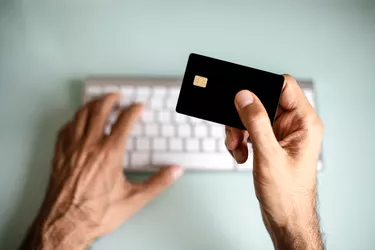
Credit cards and debit cards are wonderful conveniences but they carry risks. A lost or stolen card or card number can cost you money and time. A credit card ID number is one of several security features that are used to protect the security of your credit and debit cards. You should know what a credit card ID number is, where to find it, and how it is used in order to keep your accounts as secure as possible.
Tip
The first few numbers on the front of a credit card comprise the Issue Identification Number (IIN), which identifies the issuing financial institution. The series of three or four numbers on the back of a credit card comprise the Card Verification Value (CVV), which is the user's validation (or security) ID code.
Video of the Day
Types of Card Identification Numbers
There are several numbers associated with each of your credit and debit cards. The sixteen-digit number on the front is your account number. Also on the front of the card is the expiration date.
Video of the Day
For each credit or debit card you also have a personal identification number (PIN) which is a 4-digit code used to access ATMs. But there is one more number: the credit (or debit) card identification number (also called the card security code or verification code).
Credit Card Security ID Number
Look on the right side of the signature strip on the back of a credit card. You'll see a 3 (sometimes 4) digit number, possibly proceeded by the last 4 digits of your account number. This is the credit card ID number. It is used for "not in person" transactions.
When you use your credit card by phone or online the merchant should request this number. The purpose is to prevent someone who has obtained your account number from using it for online or phone transactions.
Precautions Against Card Identity Theft
Because your credit card ID number is part of the security measures designed to protect your account, it's important to take the same precautions you take with your account number and PIN.
Don't disclose any of your account information unnecessarily. Don't give any numbers over the phone if the other party called you. Keep track of your cards and don't leave them unattended unless you have them secured (by putting them in a locker when you go to the gym, for example). Shred any papers that have credit or debit card information on them before you dispose of them.
Notifying Credit Card Issuer
No matter how careful you are, a card can be lost or stolen. For your protection, make a list of the account number and expiration date of each of your credit and debit cards. Include the emergency number located on the back of each card. Don't include either your PIN or credit card ID number.
Keep the list in a safe place separate from your cards. If a card turns up missing, use the emergency number immediately. If you notify the credit card issuer within 48 hours you can be held responsible for at most $50 in charges.
Monitoring Credit Card Transactions
In addition to keeping your credit card ID number and other information confidential, monitor your transactions. Keep your receipts (but collect and destroy any carbons) and verify their accuracy on your monthly statement. Most credit card companies have online features that enable you to track transactions without waiting for your statement to arrive. If you notice any discrepancy, report it to the credit card company right away.